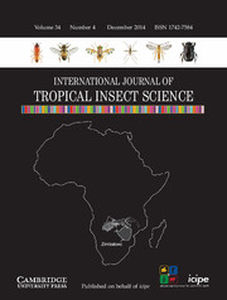Article contents
Phenology and survival of the maize stalk borer, Busseola fusca in Eastern Ethiopia
Published online by Cambridge University Press: 19 September 2011
Abstract
The current phenological study in sorghum fields has shown that Busseola fusca is bivoltine in eastern Ethiopia. The first generation begins at the end of April, while early August marks the beginning of the second (Diapause) generation. The second generation passes through the dry season in stalks and stubble as diapause larvae, of which a considerable proportion survive in the stubble until the next crop. The onset of pupation of the diapause larvae is in the middle of April. A progressive increase in the mortality of the larvae of both generations is observed towards the later stages. Five hymenopterous parasitoids, Bracon sesamiae (Cameron), Cotesia (= Apanteles sensu lato) sesamiae (Cameron), Dolichogenidea (= Apanteles sensu lato) sp. near laevigatus, Pediobius furvus (Gahan) and Procerochasmias nigromaculatus (Cameron) and one dipterous parasitoid (Sarcophaga sp.), attacking larvae and pupae of B. fusca at Alemaya, eastern Ethiopia, were identified.
Résumé
La présente étude phénologique dans les champs de sorgho a montré que Busseola fusca est une espèce bivoltine dans l'Est de l'Ethiopie. La première génération commence à la fin avril alors que début août marque le commencement de la seconde génération (diapause). Le seconde génération passe le saison sèche dans les tiges et dans les chaumes en tant que larve en état de diapause dont une grande proportion survit à l'intérieur des chaumes jusqu'à la prochaine culture. Le début de la pupaison de la larve en état de diapause a lieu au milieu d'avril. Une progression de la mortalité chez les larves des deux générations au fur et à mesure de l'avancement des stades a été observée. Cinq hyménoptères parasitoïdes, à savoir Bracon sesamiae (Cameron), Cotesia apanteles (sensu lato) sesamiae (Cameron), Dolichogenidea (= Apanteles sensu lato) sp. near laevigatus, Pediobius furvus (Gahan) et Procerochasmias nigromaculatus (Cameron) et une larve de diptère parasitoïde (Sarcophaga sp.) s'attaquant aux larves et aux pupes de B. fusca ont été identifiés à Alemaya, Est de l'Ethiopie.
- Type
- Research Articles
- Information
- Copyright
- Copyright © ICIPE 1994
References
REFERENCES
- 1
- Cited by


